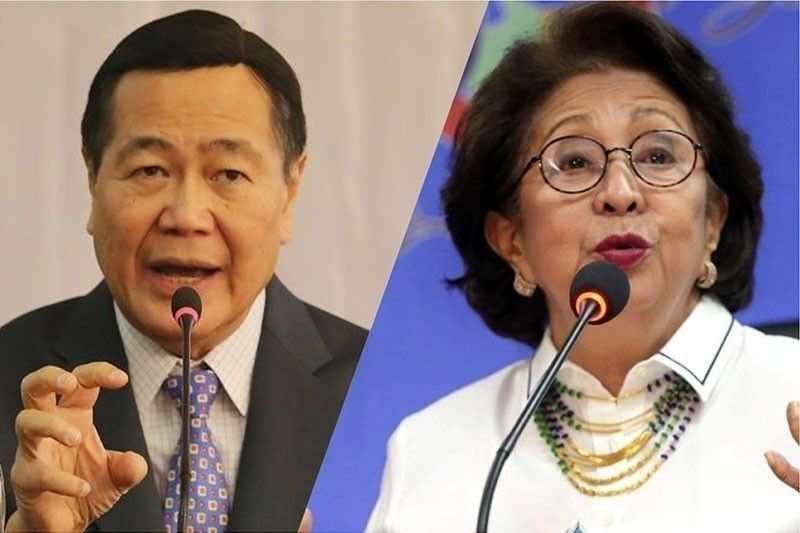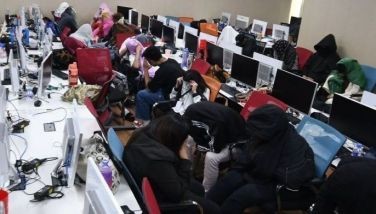'Clear threat': Ex-SC justices seek Solgen comment on Parlade's social media post

MANILA, Philippines — Petitioners against the controversial Anti-Terror Law on Monday sought before the Supreme Court for the solicitor general to explain a social media post by a military general tagging those contesting the legislation as having armed communist ties which they described as a "clear threat."
Retired Supreme Court justices Antonio Carpio and Conchita Carpio Morales led others in a petition asking Solicitor General Jose Calida if posts by Lt. Gen. Antonio Parlade should be considered an official communication from government.
Parlade, who has had a long record of blatantly tagging individuals and institutions as having ties with the CPP-NPA without proof, wrote in a Facebook post that "very soon, blood debts will be settled" addressing petitioners, and that "the long arm of the law will catch up on you and your supporters."
Such incident of "red-tagging" which had often resulted in dangers for those named, are no longer new coming from Parlade, who is the armed forces' commander for southern Luzon.
Recently, he had rehashed his unsubstantiated claim that 18 schools in Metro Manila are breeding grounds for the CPP-NPA, an allegation that universities rebuked. For this and many other documented cases, he is facing criminal and administrative charges before the Ombudsman.
And while Parlade did not name Carpio or Carpio Morales, he did mention lawmakers from the Makabayan bloc in Congress who are contesting as well as the legality of the anti-terror law.
"Petitioners believe this is a matter of serious concern that requires judicial remedy as the post, if indeed made by a state actor, construes the [anti-terror law] to be able to penalize the right to seek judicial relief before the Honorable Court," the petition read. "Designed to intimidate, the post also amounts to interference with the [court's] power to administer justice, as it is directed to the parties and their counsel days before the matter is heard."
Among those joining the petition are former Supreme Court spokesperson Theodore Te, UP professor Jay Batongbacal, Dante Gatmaytan, Victoria Loanzon, Anthony Charlemagne Yu, Francisco Ashley Acedillo and Tierone James Santos.
Together, they asked the high court to direct Calida to turn in a written explanation before February 2, when oral arguments are set for the anti-terror law, "confirming whether or not the social media post" is an official government messaging, including the circumstances behind it and its intent.
"The post is a clear threat to Petitioners Carpio, Carpio Morales, et al. for seeking redress before the Honorable Court. Though some portions directly name specific persons, the post also groups together petitioners as part of "individuals, groups and organizations" who should be monitored for "opposing a law that will protect citizens from terrorists," the petition added.
Enacted in July 2020, the anti-terror law is facing 37 petitions before the Supreme Court to strike it down as unconstitutional. The oral arguments were originally set on January 19, but had since been moved to February 2 after Calida said his staff had contracted the coronavirus.
Many groups have long contested the measure, even before it was signed into law, warning that its provisions and the vagueness of how it defines "terrorism," could be used to stifle dissent and run after government critics.
Since its enactment, two Aetas have already been charged for supposed violation of the measure, while only recently, the defense department ended its accord with state-run University of the Philippines after the CPP-NPA was named a terrorist group by the Anti-Terrorism Council which was created under the said law.
The oral arguments in February will see legal luminaries, eight lawyers in particular, including ex-solicitor general Jose Anselmo Cadiz and former law dean Chel Diokno, presenting their case in a bid for the court to strike down the highly contested legislation. — Christian Deiparine with reports from Kristine Joy Patag and Gaea Katreena Cabico
President Rodrigo Duterte signed the Anti-Terrorism Law on July 3 despite opposition from rights groups and civil society groups that it could be used to stifle human rights.
A petition against the law has been filed at the Supreme Court and other groups are preparing pleadings of their own.
Follow this page for updates. Photo courtesy of The STAR/Michael Varcas
National Security Adviser Hermogenes Esperon moves to block access to several websites, including news sites of alternative news orrganizations Bulatlat.com and Pinoyweekly.org.
In his letter to the National Telecommunications Commission, he only says the websites are "affiliated to and are supporting these terrorists and terrorist organizations."
No other basis to back up his allegation was cited in the letter.
Citing the designation of the CPP-NPA-NDF as terrorists, NSA Hermogenes Esperon moves to block access to several sites.
— Kristine Patag (@kristinepatag) June 22, 2022
In Esperon's letter to the NTC, he included news sites @bulatlat and @pinoyweekly; sites of other progressive groups RMP and Save our Schools. @PhilstarNews pic.twitter.com/nAzMITJFsS
The Commission on Human Rights says it "partly welcomes" the Supreme Court decision that some parts of the controversial Anti-terrorism Law are unconstitutional.
CHR spokesperson Jacqueline de Guia says the commission remains hopeful that the remaining contentious provisions of the law will be clarified by the high cour in the full text of the decision.
"At the same time, our commitment remains in guarding against possible human rights violations arising from the implementation of the anti-terror law. We steadfastly remind the government that countering terrorism and protecting human rights are not competing values but are, in fact, mutual and complementary," De Guia says in a statement.
The Supreme Court has deliberated and voted on the controversial Anti-Terrorism Act but the decision will be released "at the soonest time possible."
"However, considering that there were numerous issues resolved in the case, as well as the fact that each Justice had to vote on each issue, there is a need to accurately confirm and tally the vote of each Justice in order to ensure the correct resolution of the Court per issue," SC spokesperson Brian Hosaka says.
The Anti-Terrorism Council designates the National Democratic Front of the Philippines, the panel that negotiates for communist rebels during peace talks a terrorist organization.
Previous designation of the Communist Party of the Philippines and New People's Army led to the designation of supposed members of the CPP's Central Committee. Among those designated as terorrists were peace consultants.
Designation gives the Anti-Terrorism Council the authority to investigate and freeze the accounts of designated persons.
The Anti-Terrorism Council has designated 29 people, including alleged members of the Communist Party of the Philippines-New People's Army, as terrorists in two resolutions.
Designation allows the Anti-Money Laundering Council to freeze the assets of those on the list.
- Latest
- Trending



































